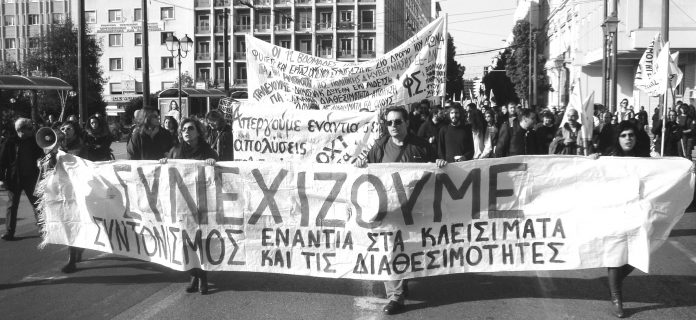THE Greek coalition government of Prime Minister Antonis Samaras is in a crisis following disagreements over more barbaric economic measures demanded by the EC-IMF-ECB creditors.
Last week the OECD’s Director-General Angel Gurria visited Athens and also demanded that the government introduces legislation for additional taxes on property and the sequestration by the banks of the homes and shops of people who cannot pay their mortgages.
The troika of the EC-IMF-ECB are also demanding further mass sackings in the public and private sectors and the obliteration of the national health service and state university education.
As a first step they demand fees be imposed on health treatment and higher education.
But a large number of government parliamentary deputies have vowed in public that they would not vote for such measures.
The Greek Statistics Authority have just published a Report which shows that 34 per cent of the population is on the verge of poverty while 23 per cent lives under the so-called poverty line.
The revolutionary resistance of the Greek workers and the middle class was vividly expressed last week in the continuing strikes by Athens University staff, now in their 13th week, and by the doctors and staff of state medical centres who have extended their strike to December 9th.
Last Friday over 3,000 state medical centres staff and doctors, along with ERT (sacked state TV and radio corporation) workers and university administrative workers, participated in a militant demonstration from the Health Ministry to the Vouli (Greek parliament).
The Health Minister said that if doctors carry on with their strike he will sack all 5,000 of them. So the dominant slogan at the demonstration was ‘We will sack the government!’
Some 1,000 inhabitants of the large Aegean island of Ikaria sailed all night to take part in the demonstration in a fight to secure the future of the two hospitals on the island and that they remain open and functioning.
The workers’ fight was reflected in the ADEDY (public sector trades unions federation) executive elections where, for the first time, the social-democrats and the conservatives combined failed to gain a majority.
They now have just eight executive members, down from thirteen, while the Greek Communist Party, the Coalition of the Radical Left and the ANTARSYA forces gained seven executive members, up from four.
A social-democratic formation, that poses as an anti-government force, gained two executive members and now holds the balance.
The pressure on the Greek coalition government is thus mounting from both sides.
Next year’s Budget was announced ten days ago, to be denounced within hours by the European Commission, an unheard of event.
Now, after deliberations, the government said that the Budget will be debated next weekend in the Vouli but no-one is certain.
But while the Greek government reels as it is deprived of the full backing of its EC and IMF overlords, the trade union bureaucracy refuses even the mildest protest or mobilisation.
Nor do the Coalition of the Radical Left or the Greek Communist Party intend to call out workers on strike and occupations.
Several small trade unions involved in the Coordination against Closures and Sackings have called for strike action and for a march next Friday, along with the striking medical centre doctors and staff, and ERT workers, cleaners and university administrative workers.
The government have been humiliated by the university administrative workers’ strike despite the use of law courts, riot police and threats.
But it is clear that the government is to employ the reactionary social-democratic and conservatives’ coalition, that has the majority of one at the Athens University trade union, to break the strike this week.
Administrative workers have called on students, parents and trade unions to support them this morning.
Last Saturday, the Athens police banned two anti-fascist rallies and marches in the capital as well as a rally by the fascist Golden Dawn party.
About 2,000 workers and youth together with immigrant workers gathered at the Univesrity of Athens in the city centre and, despite the police ban, marched towards the Vouli but were cut off by a large riot police force and buses blocking the streets.
